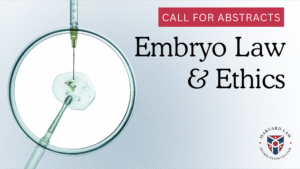The Petrie-Flom Center for Health Law Policy, Biotechnology, and Bioethics at Harvard Law School is pleased to announce our 2026 Annual Conference: Embryo Law and Ethics.
This year’s conference is organized by the Petrie-Flom Center’s Faculty Director I. Glenn Cohen and Executive Director Susannah Baruch in collaboration with Judith Daar, the Ambassador Patricia L. Herbold Dean and Professor of Law at Northern Kentucky University Chase College of Law, and O. Carter Snead, the Charles E Rice Professor of Law and Concurrent Professor of Political Science at the University of Notre Dame.
Support is provided by the Oswald DeN Cammann Fund at Harvard University and the ASRM Center for Policy and Leadership.

Call for Abstracts
We seek papers that offer innovative perspectives and inventive approaches. Abstracts should focus on the fresh contributions the paper will make, including sketches of the supporting arguments. The abstract should include (but not be limited to) a paragraph summarizing the issue at hand.
Potential Topics Include:
- The status of the in vitro embryo in current law and changes, if any, since Dobbs.
- The “personhood” or other potential special moral or legal status of embryos in vitro.
- Legal and ethical implications of research involving human embryos at the state and federal levels.
- Human embryos and private law (e.g., contract law, tort law, etc.) and family law.
- The rights and interests of offspring born from embryo or gamete donation.
- The status of human embryos in scientific research and public funding for that research.
- The rights and responsibilities of individuals who donate gametes or embryos to other parties seeking to reproduce.
- The use of genetic testing and other emerging technologies to select or “edit” embryos and concerns about safety, eugenics, and “enhancement.”
- Commercialization, commodification, and intellectual property issues related to human embryos.
- IVF practices including embryo creation, screening, selection, storage, disposal, donation/adoption to prospective parents, and donation to research.
- Legal, ethical, policy, and social issues involving in vitro human embryos outside of the U.S. (including the work of intergovernmental bodies).
- Creation of and research involving “synthetic” embryos (and the related topic of artificial wombs).
This list is not exhaustive; we hope to receive abstracts related to the conference’s central questions even if the topic was not specifically listed here. Successful abstracts will propose or outline an argument/position, rather than merely stating a topic. We welcome submissions on both broad conceptual questions and more specific law and policy issues. Papers that focus on ethics should include substantial discussion of policy implications. Relatedly, law will be treated broadly to include governmental policy decisions more generally. Purely technical submissions will likely be outside the scope of this conference.
To encourage interdisciplinary and international dialogue, we welcome submissions from legal scholars and lawyers, bioethicists, philosophers, clinicians, medical researchers, mental health professionals, disability rights advocates, public health scholars and practitioners, economists and other social scientists, government officials and staff, and others who have a meaningful contribution to make. But we emphasize that whatever their disciplinary training, the abstract and paper should clearly focus on the legal side of any issue discussed. We welcome philosophical and legal reflections from contributors across the world, with preference to contributions that are general, United States-focused, or explicitly comparative in nature. We welcome submissions from advocacy organizations, think tanks, and others outside academia, but emphasize that this is a scholarly conference, and abstracts/papers will be held to academic standards of argumentation and support.
How to Participate
If you are interested in participating, please send a one-page abstract of the paper you would plan to present to petrie-flom@law.harvard.edu as soon as possible, but not later than 11:59 p.m. ET on November 2, 2025.
If your abstract is selected, your final paper will be due on March 31, 2026, and you will be assigned a presentation slot for the conference. All presenters must provide a full final draft in order to participate. Presenters are expected to attend the conference for its full duration. We will accept conference papers of all lengths and styles (e.g., law review, medical, philosophy, or policy journal, etc.), but presentations will be limited to 10 minutes plus time for Q&A.
We currently anticipate that the conference will be in person, on the Harvard Law School campus, on June 16, 2026, with a dinner the evening before.
In the past, we have successfully turned several of our conferences into edited volumes (e.g., with Cambridge, MIT, Johns Hopkins, and Columbia University presses). It is possible, although not guaranteed, that conference presenters will publish their papers with us in an edited volume whose chapters will be limited to 5,000 words, including references. All presenters should plan on contributing their submission to any subsequent volume arising from the conference and should not submit an abstract if they anticipate this will be a problem. Previous conference participants have been able to publish their submissions in different formats in multiple venues, for example, both as short book chapters and longer law review articles. However, the version that will be used for the edited volume should not have been published previously or accepted for publication separately.
Funding
We will pay travel expenses for one presenter per paper who must travel to Cambridge; co-authored papers must name the single presenter.
Important Dates
Abstract Deadline: November 2, 2025
Paper Deadline: March 31, 2026
Conference: June 16, 2026
Please contact us with any questions at petrie-flom@law.harvard.edu.
